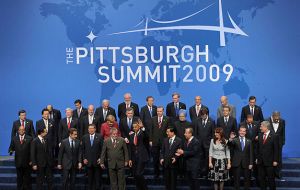MercoPress. South Atlantic News Agency
G20 summit announces “tough new regulations” but short of specific rules
 Leaders agreed to keep “pumping” money because recovery is fragile
Leaders agreed to keep “pumping” money because recovery is fragile The world's leading nations have agreed “tough new regulations” to prevent another global financial crisis, US President Barack Obama said on Friday. These relate to the amount of money banks have to hold in reserve and to excessive pay for bankers.
Speaking at the end of a two-day G20 summit, Mr Obama also outlined plans to give emerging economies a greater say in the global economy.
The G20 will effectively replace the G8 group of developed economies.
Global leaders also announced a deal to shift the balance of voting in the International Monetary Fund (IMF) towards growing nations such as China at the summit the US city if Pittsburgh.
“We have taken bold and concerted action to forge a new framework for strong, sustainable and balanced growth,” said US President Barack Obama.
“We have agreed tough new financial regulations to ensure that the reckless few can no longer be allowed to put the global financial system at risk.”
He said that leading nations would now be allowed to assess each others' economic policies. Mr Obama added that the leaders had agreed rules to ensure that executive pay would be linked to long term financial performance.
Many have criticised excessive bonuses as encouraging the kind of short term risk-taking that contributed to the financial crisis.
Despite Mr Obama's declaration, the G20 fell short of agreeing specific rules on the capital reserves that banks need to hold.
“We commit to developing by end-2010 internationally agreed rules to improve both the quantity and quality of bank capital and to discourage excessive [borrowing],” a statement from the G20 leaders said following the summit.
It added that the rules will be phased in once financial conditions improve and recovery is “assured”.
The leaders also fell short of agreeing a cap on bonuses, agreeing instead that bonus payments should not be guaranteed for many years, should be deferred in part, and should not exceed a percentage of the bank's revenue.
“We designated the G20 to be the premier forum for our international economic co-operation,” the statement said.
It added that the global leaders would shift “at least 5%” of the quota of votes within the IMF from “over-represented countries to under-represented countries”.
It described under-represented countries as “dynamic emerging markets and developing countries”. Emerging economies will also get a greater say at the World Bank.
The leaders also pledged to continue pumping money into their economies until “a durable recovery is secured”.
But there will be no formal announcement that the G20 will replace the G8 until 2011, said the BBC's economics editor Stephanie Flanders.
“The leaders would have liked formally to announce the handover today in Pittsburgh, but the Canadians - who are chairing the G8 next year - kicked up such a fuss that they had to fudge it,” she said.
There will now be a G20 meeting on the sidelines of Canada's G8 Summit next June, where most of the economic business of the day will be discussed.
But, formally at least, the economic side of the G8 will live on another year.
The IMF has 186 member-states. It lends money to countries that are facing problems, but in return economic changes have to be made by those countries.
Currently, China wields 3.7% of IMF votes compared with France's 4.9%, although the Chinese economy is now 50% larger than that of France.
The IMF has been criticised in the past as being a group of developed countries trying to lay down the law to struggling countries, which is why the decision to give growing nations more votes is important.
“If you talk to the Chinese or talk to anyone from emerging markets they say the IMF doesn't have legitimacy and... we don't trust the IMF to come and rescue us in a crisis,” Simon Johnson, former chief economist at the IMF, told the BBC.
“They don't trust it because it's US and West Europe-dominated. That's not fair... and the IMF doesn't function properly as a result.”
Nobel prize-winning economist Amartya Sen welcomed the change in voting rights, but said that, ”on their own, they won't be able to achieve much... It's not just a question of voting rights, but also a question of broadening the dialogue”. (BBC)




Top Comments
Disclaimer & comment rules-

Read all commentsI have analysed the final declaration of intentions. Aside from a lack of specific rules, I'm afraid that world leaders have failed to establish a strategic order of priorities in the 31-point document. Stating so optimistically that what has so far been done “has worked” is a rather hasty conclusion. The process thus far has a long way to go. From dumping huge amounts to save the system the governments must return to balanced budgets and inflation adjustments. Otherwise there will be hard times for placement of 50 M new unemployed all over the world. The best result of this summit is the decision to gran the G-20 first choice to lead the world in its growth and development. Nevertheless, there is ambiguity when in reality the group was composed of 20 plus 2 - Holland & Spain. Are these countries going to be inscribed as equal members or simply invited to narrate their positive experiences? World leaders mustn't confuse politicking with diplomacy. Diplomacy has its ways to say “yes” or “no” rather firmly. Politicking is a loadful of empty words and promises.
Sep 26th, 2009 - 03:17 pm 0Commenting for this story is now closed.
If you have a Facebook account, become a fan and comment on our Facebook Page!